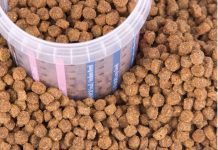Welcoming a new puppy into your home is an exciting and joyful experience, filled with playful moments and cherished memories. As a devoted pet parent, ensuring your furry friend’s health and happiness becomes a top priority. One of the fundamental aspects of nurturing a thriving puppy is selecting the right food, especially when it comes to supporting their digestive health and regularity. Just like humans, puppies can experience digestive sensitivities that require special attention and care. In this article, we will guide you through the best puppy food options that promote optimal digestion and consistent regularity, helping your little companion grow into a strong and healthy dog. With our warm and instructive approach, we aim to provide you with the knowledge and confidence to make informed decisions that cater to your puppy’s unique dietary needs. Let’s embark on this journey to discover the best nutritional choices for your beloved puppy’s digestive well-being.
Choosing the Right Ingredients for Sensitive Tummies
When it comes to selecting the best puppy food for digestive health, focusing on gentle and nourishing ingredients is essential. Lean proteins like chicken or turkey are excellent options as they are easier on the stomach and provide the necessary building blocks for growth. Opt for whole grains such as brown rice or oats, which are rich in fiber and help maintain regularity. These grains are less likely to irritate sensitive tummies compared to their refined counterparts.
Consider incorporating prebiotic fibers like beet pulp and chicory root, which support healthy digestion by feeding beneficial gut bacteria. Look for puppy foods that include probiotics, as these can further enhance digestive health. Pumpkin is another fantastic ingredient to seek out; its natural fiber content aids in digestion and helps regulate bowel movements. Lastly, ensure the food is free from artificial additives and fillers, which can often be the culprits behind tummy troubles.
- Lean Proteins: Chicken, turkey
- Whole Grains: Brown rice, oats
- Prebiotic Fibers: Beet pulp, chicory root
- Probiotics: Look for added strains
- Pumpkin: Natural fiber source
Understanding Nutritional Needs for Growing Puppies
Growing puppies have specific nutritional requirements that are crucial for their overall health and development. A balanced diet is essential to support their rapidly developing bodies and energetic nature. To ensure your puppy’s digestive health and regularity, focus on foods that provide a rich blend of proteins, fats, vitamins, and minerals. High-quality proteins are vital for muscle development, while healthy fats support brain growth and energy needs.
When choosing the best food for your puppy, look for ingredients that promote digestive wellness. Consider options that include:
- Probiotics and Prebiotics: These help maintain a healthy gut flora and improve digestion.
- Fiber-rich ingredients: Natural sources like sweet potatoes and pumpkin aid in regular bowel movements.
- Easily digestible proteins: Options like chicken or fish that are gentle on the stomach.
- Omega-3 and Omega-6 fatty acids: These support skin health and reduce inflammation.
By focusing on these elements, you can help ensure your puppy grows into a healthy and happy adult dog, with a digestive system that functions smoothly.

Top Recommended Brands for Optimal Digestive Health
When it comes to nurturing your puppy’s digestive system, choosing the right food is crucial. To ensure that your furry friend thrives, consider these top brands that have been celebrated for their focus on digestive health and regularity:
- Hill’s Science Diet: Known for its precise nutrition, Hill’s Science Diet offers recipes tailored to support healthy digestion with a blend of prebiotic fibers.
- Royal Canin: This brand offers a range of options, including specialized formulas designed to promote optimal gut flora and smooth digestion.
- Purina Pro Plan: Featuring easily digestible ingredients and live probiotics, Purina Pro Plan is formulated to maintain a balanced digestive system.
- Blue Buffalo: With a focus on natural ingredients, Blue Buffalo’s formulas include pumpkin and probiotics to aid in regular digestion.
- Wellness CORE: Known for its grain-free recipes, Wellness CORE incorporates digestive enzymes and probiotics to support gastrointestinal health.
Each of these brands prioritizes ingredients that foster digestive wellness, ensuring your puppy’s tummy stays happy and healthy.

Tips for Transitioning Your Puppy to a New Diet
Transitioning your puppy to a new diet can be a seamless process if approached with patience and care. To ensure your furry friend’s digestive health remains optimal, consider these thoughtful tips:
- Gradual Introduction: Start by mixing a small amount of the new food with your puppy’s current diet. Gradually increase the new food’s proportion over 7 to 10 days, allowing your puppy’s digestive system to adjust smoothly.
- Monitor Reactions: Keep an eye on your puppy’s stool quality and overall behavior. If you notice any signs of digestive discomfort, such as diarrhea or vomiting, slow down the transition process or consult your veterinarian.
- Consistent Feeding Schedule: Maintain regular feeding times to help regulate your puppy’s digestive system. Consistency in timing and portion size can aid in developing a healthy digestive rhythm.
- Hydration is Key: Ensure your puppy has access to fresh water at all times. Adequate hydration supports digestion and helps prevent constipation, promoting regularity.
Remember, every puppy is unique, and some may require more time to adapt to dietary changes. Stay attentive and responsive to your puppy’s needs, and you’ll set the foundation for a healthy and happy digestive journey.
















